#return navalny's body
Explore tagged Tumblr posts
Text
Putin will get the punishment that is coming to him for this and all the crimes he has committed in Russia since the late 1990s. This includes the two years since he invaded Ukraine and unleashed a campaign of genocidal terrorism against millions of innocent people.
RETURN NAVALNY'S BODY!
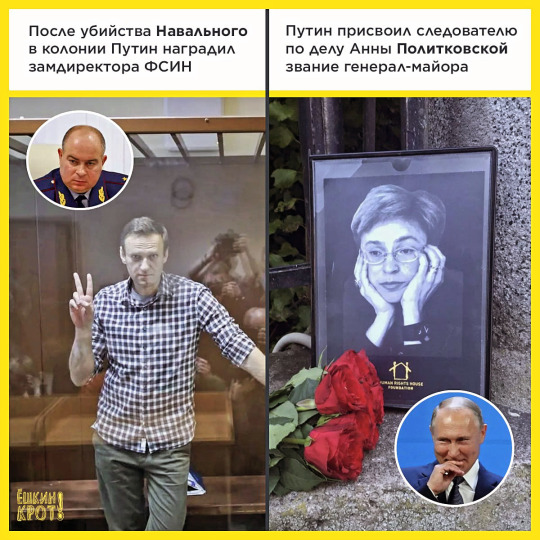
Навальный с нами вместе,
А ваш чекист - покойник.
Отдать боитесь тело -
Вы просто червяки!
Хоть вы его убили,
Но он вас похоронит.
Не хватит сил, чтоб выжить вам,
Хоть вы - силовики.
#################
Navalny remains in our hearts
While your KGB officer is a dead man.
You’re afraid to give away Alexey’s body -
You are just worms with your kremlin bosses.
Even though you killed him,
He is the one who will bury you.
You won’t have enough strength to stay above the ground
Even though you are so to speak security forces.
#return navalny's body#return navalny#make putin pay#stop russian terrorism#stop russian aggression#stop the war#free ukraine#justice for anna politkovskaya
30 notes
·
View notes
Text
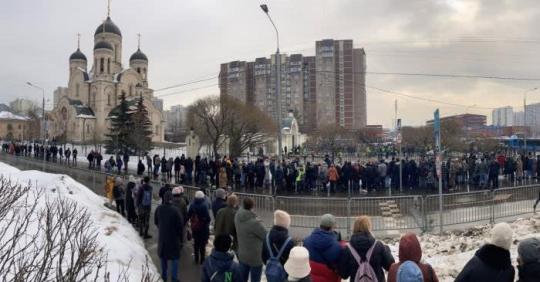
Hundreds of people gathered outside a church in south-eastern Moscow where Alexei Navalny is to be buried ahead of the Russian opposition leader’s funeral on Friday. Navalny, Russia’s most prominent critic of President Vladimir Putin and the invasion of Ukraine, died in February in a remote Arctic prison colony at the age of 47. His widow Yulia Navalnaya and exiled team have accused Putin of ordering his murder to scupper his release in a prisoner exchange.
The Kremlin has dismissed the allegations, while investigators in charge of the inquest claimed Navalny died of natural causes. Dmitry Peskov, Putin’s spokesperson, told reporters on Friday that the Kremlin had nothing to say to Navalny’s relatives and declined to comment on his political stature, according to state newswire RIA Novosti. Peskov said anyone who protested at the funeral would face a police crackdown. “We have to remind you there is a law and it needs to be observed — any unsanctioned gatherings will be against the law. So anyone who takes part in them will be held responsible under the law,” he said.
Footage on social media showed a heavy police presence outside the church amid what Navalny’s team has said is a Kremlin-directed attempt to limit public shows of support. Police arrested about 400 people who left flowers at monuments to Soviet political prisoners following Navalny’s death. Navalny’s mother, Lyudmila Navalnaya, has said officials in northern Russia refused to hand over his body for a week and threatened to let it rot unless she agreed to bury him in secret. After authorities released his body, Navalny’s team said funeral agencies refused to hold a wake for him or provide a hearse after receiving anonymous threats.
Navalny’s memorial service is to be held at the Soothe My Sorrows church in Marino, the neighbourhood where he lived for many years before he was poisoned with the nerve agent novichok in 2020. He will then be buried in the nearby Borisovsky cemetery. After recovering from the poisoning in Berlin, Navalny was arrested immediately when he returned to Moscow in 2021, and was sentenced to decades in prison on a series of charges ranging from tax evasion to extremism.
Russia banned his foundation, which prompted most of his followers to flee the country, jailed the few prominent supporters who stayed, then in effect outlawed all dissent when Putin ordered the full-scale invasion of Ukraine in 2022. The Kremlin then gradually moved to isolate Navalny from the outside world, forcing him to spend 27 stints in a punishment cell that he said amounted to torture and arresting three of his lawyers.
10 notes
·
View notes
Text
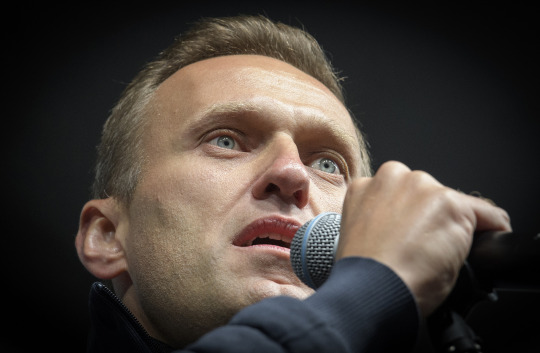
Alexei Navalny, who has died suddenly aged 47 while in prison, was Russia’s best-known campaigner against high-level corruption. For many years he was the leading critic and opponent of President Vladimir Putin and his political party, United Russia.
Repeated arrests, jail sentences and physical assaults did not deter Navalny from digging up financial scandals, which he published on his blogs and X feeds as well as YouTube. In a 2011 radio interview, he described United Russia as a “party of crooks and thieves”, which became a powerful and popular mantra on social media and at political protests.
Repression did not stop him attracting enthusiastic crowds in support of opposition politicians in local elections in cities across Russia. Occasionally he ran for office himself, most notably in 2013 for the mayoralty of Moscow, when the official result gave him 27% of the vote – which he said was rigged so as to deny him victory.
In 2016, Navalny launched a campaign for the 2018 presidential election but was barred by Russia’s central election commission due to a prior criminal conviction. In 2017 he was attacked with a spray, leaving him partially blind in one eye. In 2019 Navalny fell ill in prison, from what he claimed was poison. His most dramatic brush with death came in 2020 at the end of a political campaign trip through Siberia, when he was taken seriously ill on a flight from Tomsk to Moscow. His condition was so grave that the pilot made an emergency landing in Omsk, where he was rushed to hospital. Navalny’s wife and supporters asked for him to be taken to Germany, where they felt he would be better treated.
The Russian authorities agreed and Navalny was flown to the Charité hospital in Berlin, where toxicology tests showed traces of the nerve agent novichok in Navalny’s body. Russian officials complained that the test results were not made public nor disclosed to them. Navalny recovered and was released from hospital after a month.
He decided to convalesce for several weeks in Germany. Russian court authorities announced that if he returned late to Moscow he would be jailed for breaking the terms of a probation order. The threat was seen as a device to deter Navalny from returning to Russia in the hope, as the authorities saw it, that in exile his influence would rapidly decline.
Showing great courage, but defying the advice of his family and friends, he flew back to Moscow in January 2021, accompanied by his wife and dozens of journalists, and was arrested on landing. His Anti-Corruption Foundation promptly published on YouTube an investigation with pictures of a luxury multimillion-dollar mansion on the Black Sea, which they dubbed Putin’s palace.
Navalny’s stock had never been higher at home or abroad, and when a court gave him a two-and-a-half year sentence, western political leaders, including the US president, Joe Biden, protested openly and imposed sanctions. But Putin was determined to destroy him politically.
In 2022, Navalny was sentenced to an extra nine years after being found guilty of embezzlement and contempt of court. In 2023, he was given a further 19 years in prison on extremism charges.
Navalny was born in Butyn and grew up mainly in Obninsk, a small town south-west of Moscow. His mother, Lyudmila, worked as a lab technician in micro-electronics and then moved to a timber-processing factory. His father, Anatoly, a Ukrainian, was in the military. In addition to Russian, Alexei learned Ukrainian through spending summers with his grandmother near Kyiv. He gained a law degree (1998) at the Peoples’ Friendship University in Moscow.
In 2000 he joined the United Democratic party, known as Yabloko. Under its leader, Grigory Yavlinsky, the party stood for liberal and social democratic values. Navalny gained an economics degree at the Financial University (2001), and from 2004 to 2007 served as chief of staff of the Moscow branch of Yabloko. A charismatic speaker, he was attracted by the concept of television debates, and in 2005 founded a social movement for young people, with a name taken from the Russian word for yes, DA! – Democratic Alternative, which was active in the media.
Navalny started to move gradually to the right, and in 2007 he was expelled from Yabloko after clashing with Yavlinsky over Navalny’s increasingly nationalist and anti-immigrant views.
He then co-founded a movement known as Narod (The People), which aimed to defend the rights of ethnic Russians and restrict immigration from Central Asia and the Caucasus. A year later he joined two other Russian nationalist groupings, Movement Against Illegal Immigration (MAII) and Great Russia, in forming a new coalition called the Russian National Movement.
It made little impact and Navalny turned his attention to journalistic muckraking. His main outlet was a blog, LiveJournal. In 2010 he published leaked documents about the alleged theft by directors of millions of roubles from the pipeline company Transneft. The following year he exposed a scandalous property deal between the Russian and Hungarian governments. He decided to establish the Anti-Corruption Foundation, which continued until his death.
He also went back into electoral politics, leading street protests over unfair practices by United Russia. Navalny urged people to vote any way they liked in the 2011 parliamentary elections, including for the Communist party, so long as they voted against United Russia. He was tempted to run against Putin in the 2012 contest for the presidency, but said the ballot would be rigged. After the poll, he led several anti-Putin rallies in Moscow and was briefly arrested.
The following year Moscow was to elect its mayor. Navalny registered as one of six candidates. The next day he was sentenced to five years on embezzlement and fraud charges. Initially he called for an election boycott, but when he was released on appeal he changed his mind. Some analysts speculated that Putin wanted him to run to make the electoral contest look genuinely open. Navalny lost to the incumbent mayor and Kremlin ally Sergei Sobyanin, but claimed to have won. In 2016 he announced he would stand against Putin in the 2018 presidential contest. More arrests and repression followed.
Navalny’s nationalism put him in agreement with Putin on one major issue: Crimea. The territory had been ceded to Ukraine in 1954, but in 2014 Putin used force to reincorporate it into Russia. Navalny said he would not return it to Ukraine if he had the power to do so. Like Putin, he argued that Ukraine was an artificial construct. “I don’t see any kind of difference at all between Russians and Ukrainians,” he said, while admitting his views might provoke “horrible indignation” in Ukraine.
However, his agreement with some of Putin’s views on Ukraine did not bring him to support Putin’s invasion of Ukraine in February 2022. That March, Navalny released a statement from jail. Through his spokesman he urged Russians “to overcome their fear” and take to the streets and demand a “stop to the war” against Ukraine. He called Putin an “obviously insane tsar”. “If in order to stop the war we have to fill prisons and paddy wagons with ourselves, we will fill prisons and paddy wagons with ourselves.”
“Everything has a price, and now, in the spring of 2022, we must pay this price. There’s no one to do it for us. Let’s not ‘be against the war’. Let’s fight against the war.” At the end of 2023 he was transferred to the remote penal colony at Kharp, north of the Arctic circle.
In 2000 he married Yulia Abrosimova, and she and their daughter, Daria, and son, Zakhar, survive him.
🔔 Alexei Anatolievich Navalny, politician and anti-corruption campaigner, born 4 June 1976; died 16 February 2024
Daily inspiration. Discover more photos at Just for Books…?
16 notes
·
View notes
Text
Heroes
I was troubled, but also very moved, by the death of Alexei Navalny, the personality at the core of the resistance movement in Russia struggling to oppose the dictatorial and oppressive policies of the Putin regime. What exactly happened is not at all clear. At the time of his death, Navalny was imprisoned in a penal colony in Western Siberia in a place called Yamalo-Nenets near the Arctic Circle. According to the warden, he was taking a walk just two weeks ago after telling some guards that he didn’t feel at all well. And then he collapsed. The prison authorities claim to have done all they could to resuscitate him, but were, they said, regretfully unsuccessful, as result of which regretted unsuccess he was dead by mid-afternoon. His body was then held for well over a week and then finally released to his family for burial. And so ended the life of one of the world’s true heroes, a man who not only put his life on the line to stand up for his beliefs, but who personally embodied the struggle for human rights in today’s Russia. Yehi zikhro varukh. May his memory be a blessing for his co-citizens in Russia and for us all.
There’s a lot to say about Navalny, but the detail—one among many—that is particularly resonant with me has to do with his return to Russia in 2021, an act that was as noble as it was death-defying. By 2021, of course, Navalny had a long history of being a thorn—and an especially sharp one at that—in the side of Vladimir Putin. He had led countless demonstrations against the Putin government. He repeatedly accused, certainly correctly, Putin of engineering his own victories whenever he stood for re-election as Russia’s president. And he openly opposed the war against Ukraine.
Navalny tried several times to gain a foothold in the bureaucracy he so mistrusted. He ran for mayor of Moscow in 2013. And then he ran for president of Russia in 2018, a move that was in and of itself daring given that he had previously been found guilty of embezzlement, which detail would normally have disqualified him from running for elected office despite the fact that there appears to be no reason to think that the verdict was just or reasonable. But the real reason Navalny was such a problem for Putin was that he appeared to be unfazed by the forces of government, including the Russian judiciary, that were openly and brazenly arrayed against him. And so the government eventually took matters to a new level.
In 2020, on a flight to Moscow, Navalny took ill and ended up on a ventilator in the Siberian city of Omsk, where his airplane had been obliged to make an emergency landing. It didn’t take doctors long to realize that he had been poisoned. (It later came out that his clothing, including his underwear, had somehow been suffused with the Novichok nerve agent, a poison known to have been used by Russia in the past to murder dissidents abroad.) Eventually, the German government, acting unilaterally, sent an airplane to Omsk to bring Navalny to Germany. Amazingly, this actually worked. And it was in Berlin that doctors at the famous Charité Hospital determined with certainty that Navalny had been the victim of an unsuccessful attempt on his life and that he had definitely been poisoned. Remarkably, his life was saved and he recovered. And then, in January of 2021, he returned to Russia.
Because Navalny had been convicted in a 2014 trial that was almost certainly politically motivated and unjust, he had theoretically been forbidden to leave Russia even for medical treatment. And so was he arrested at the Moscow airport upon his return to Russia and imprisoned to await a judge’s decision about his future. And it was just a month after that, in February of 2021, that a Moscow judge decreed that his suspended sentence, minus time served, would be replaced with an unsuspended one and that Navalny would have to serve two and a half years in a Russian prison. He was sent to one prison, then to another. Eventually, the government determined that it did not want to face a freed Navalny in less than three years and so began new proceedings against him again, this time charging him with fraud and contempt of court. In March of 2022, just two years ago, he was found guilty of all charges and sentenced to nine years in a maximum security prison. And then, because even nine years was apparently not long enough, Navalny was put on trial again last summer and sentenced to an addition nineteen years on extremism charges. And so he ended up in the Arctic Circle prison in which he died two weeks ago at the age of forty-seven.
Navalny’s is a long, complicated story. But the one detail that stands out to me, the single part of the story that is the most resonant with me—and with my lifelong interest in the concept of heroism—has to do with Navalny’s decision in January 2021 to leave safety in Berlin and return to Russia. He had every reason to expect that he would be arrested upon return. He had no reason to suppose that any future trials to which he would be subjected would be just. He surely knew not to expect clemency or mercy from Vladimir Putin, the man behind all the juridical procedures overtly and unabashedly designed to silence him. And yet he chose to return—not specifically, I’m sure, because he wanted to die or because he wanted to participate in yet another crooked trial, but because he saw himself as a moral human being who had been granted the opportunity to inspire his co-citizens to demand justice and freedom for themselves and for their nation.
I’ve written in this space, although not too recently, about my boundless admiration for Dietrich Bonhoeffer, the German pastor who was safe and sound in New York when the Second World War broke out, but who made the noble (and eventually fatal) decision to return to Germany and there to try to inspire people to resist Nazism and to turn away from the path of ruinous and fascist barbarism down which the Nazi government was intent on leading the nation. (To revisit my comments about Bonhoeffer from 2011, click here.) Here was, in my eyes, a true hero: a man fully committed to his own ideals who made the conscious decision to leave the safe haven he had already found and to travel to a land that would probably, and which eventually did, kill him. To me, that decision to risk everything to attempt, even quixotically, to do good in the world represents the essence of heroism. It came to naught, of course. He did a lot of good for a lot of people, but, in the end, he paid the big price. On April 8, 1945, just a month before the end of the war, Bonhoeffer was tried on the single charge of treason in a court set up in the Flossenbürg concentration camp. There were no witnesses. No evidence against him was brought forward, nor was a transcript of the proceedings made. He was found guilty, apparently on Hitler’s personal order, and executed the next day in a way that was specifically intended to maximize his personal degradation and agony. (Eric Till’s 2000 movie, Bonhoeffer: Agent of Grace, is a worthy attempt to tell Bonhoeffer’s story even if the director couldn’t quite bring himself to depict the barbarism of Bonhoeffer’s final moments in any detail, let alone explicitly. For a more detailed account of his life, I recommend Eric Metaxas’s 2020 biography, Bonhoeffer: Pastor, Prophet, Martyr, Spy, which I read a few years ago and enjoyed immensely.)
So, two men who lived scores of years apart, who spoke different languages, who came from different countries. One, a political man fully engaged by the political process. The other, a man of God fully in the thrall of his own calling to preach God’s word in the world and to inspire others to seek justice and to act righteously. But both heroes in my mind—both fully safe in a place their tormentors could not reach them and yet both of whom made the decision to return to their separate homelands to seek out in those places the destiny to which each felt called. Would I have left New York in 1939 or Berlin in 2021 to risk my own life to follow the destiny I perceived to be my own? I’d like to think I would have. Who wouldn’t? But we don’t all have it in us to act that boldly, to risk everything to be ourselves fully and in the most noble way possible. To be a man in full—or a woman in full—is never quite as easy in real life as it sounds as though it should be on paper. And that is why I admire those two men, Bonhoeffer in his day and Navalny in ours—and their willingness not merely to talk the talk, but truly—and at their own mortal peril—to walk the walk. May they both rest in peace!
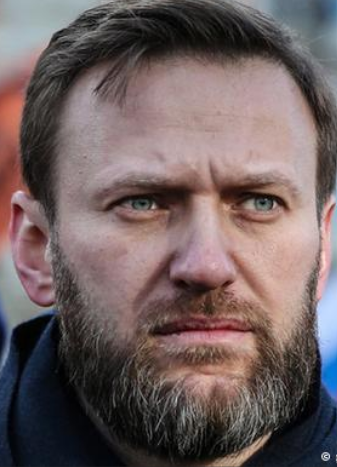
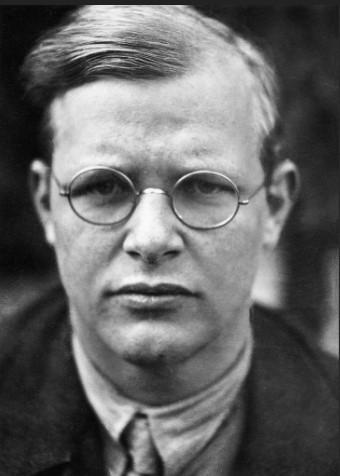
4 notes
·
View notes
Text
In a video posted on Alexey Navalny’s YouTube channel on Monday, the Russian opposition leader’s widow, Yulia Navalnaya, announced that she plans to continue his work in his absence. She also said she knows “exactly why Putin killed Alexey three days ago” and that Navalny’s team will reveal more about this in the near future.
“I wasn’t supposed to be making this video,” she said. “Somebody else was supposed to be in my place. But that person was killed by Vladimir Putin.” She continued:
Putin killed the father of my children. Putin took away the most precious thing I had, the closest person to me, and the person I loved most in the world. But Putin also took Navalny from you all.
In killing Navalny, she told Russians, Putin didn’t just want to kill one person: “He wanted to kill our hopes, our freedom, and our future.”
“Alexey died in a penal colony after three years of torture and agony,” she said:
He wasn’t just behind bars like other prisoners. He was tortured. He was held in an isolation cell, in a concrete box. Please just imagine it: a room of only six or seven square meters [65-75 square feet]. Nothing in it but a stool, a sink, a hole in the floor instead of a toilet, and a bed that’s attached to the wall so you can’t lie down. A cup, one book, and a toothbrush. Nothing else, for hundreds of days.
But despite being tortured and starved for three years, Navalnaya said, her husband didn’t give up:
And not only did he not give up, but he supported us the entire time: encouraging us, laughing, joking, and inspiring us. Never for a fraction of a second did he have doubts about what he was fighting and suffering for.
It was because of this perseverance, she continued, that Putin ultimately killed Navalny. “[He killed him] in a disgraceful and cowardly way, never daring to even look him in the eyes or even say his name,” she said. “And in the same despicable and cowardly fashion, they’re now hiding his body, refusing to show it to his mother, not handing it over, pathetically lying, and waiting until the traces of yet another batch of Novichok [poison] disappear.”
“We know exactly why Putin killed Alexey three days ago,” Yulia said. “We’ll tell you about it soon.”
Navalnaya vowed that she and her husband’s associates will find out “exactly who committed this crime and how” — and will reveal the perpetrators’ names and faces.
She also addressed the question of why her husband returned to Russia to face certain political imprisonment after being poisoned by the Putin regime three years ago. “After all, he could have lived peacefully, taken care of himself and his family, right?” she told viewers. “He could have stopped speaking out, stopped investigating, stopped fighting, right? No, he couldn’t have,” she said:
Alexey loved Russia more than anything in the world. He loved our country. […] So deeply and sincerely that he was ready to give his life for it. And his immense love will be enough for us to continue his work. For as long as it takes. Just as fiercely and just as bravely as Alexey himself.
“By killing Alexey,” Navalnaya said, “Putin killed half of me — half of my heart and half of my soul. But I still have the other half. And it’s telling me I don’t have the right to give up.”
She called on Russians to join her:
I will continue the work of Alexey Navalny. […] And I call on you to stand beside me. Not only to share the grief and the endless pain that has engulfed us. I ask you to share the fury. The fury, the anger, the hatred towards those who have dared to destroy our future.
She ended with a clip of Alexey Navalny himself from the 2022 documentary about his poisoning. “All that’s necessary for evil to triumph is for good people to do nothing,” he told his compatriots. “So don’t do nothing.”
4 notes
·
View notes
Text
ALEXEI NAVALNY
ALEXEI NAVALNY
4 June 1976 – 16 February 2024
ALLEGED VICTIM OF VLADIMIR PUTIN
Alexei Navalny was a Russian political leader who was a strong opponent to Vladimir Putin who became a political prisoner and was possibly murdered.
In 2017, he suffered eye injuries after being assaulted with a green disinfectant by an unknown person. In 2020, Navalny was poisoned with a nerve agent and he was flown out of Russia to be treated in Germany. He survived and returned to Russia and accused Putin of being responsible for his poisoning. Immediately after returning home he was detained which resulted in mass protesting across Russia. He was sentenced for nine years imprisonment which Amnesty called a ‘sham’. Navalny was transferred to a high-security prison and was given an additional 19 years imprisonment on charges of extremism.
During imprisonment he was locked up in a concrete block where cameras watched him from the ceiling. In December 2023, he went missing from prison for three weeks. He was discovered in a strict corrective colony, Kharp, Russian Arctic. The day before his death he appeared via video link for a court hearing, he appeared to be in good health.
On 16 February 2024, the Russian prison system announced that Navalny, 47, had died. They stated he lost consciousness after taking a walk. One inmate reported that there was unusual activity at the prison the day before his death and several camers were turned off. Navalny had brusies on his body, however it was alleged that the bruises took place post-mortem.
His death sparked protests in Russia as well as in other countries.
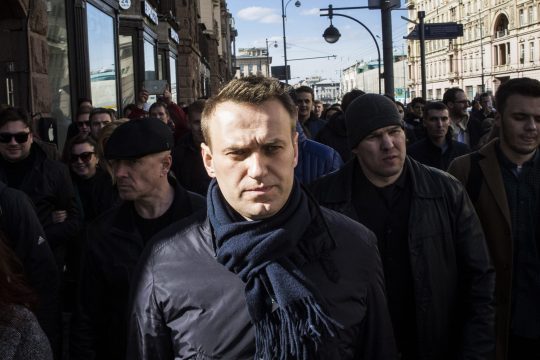
#alexeinavalny #vladimirputin
1 note
·
View note
Text
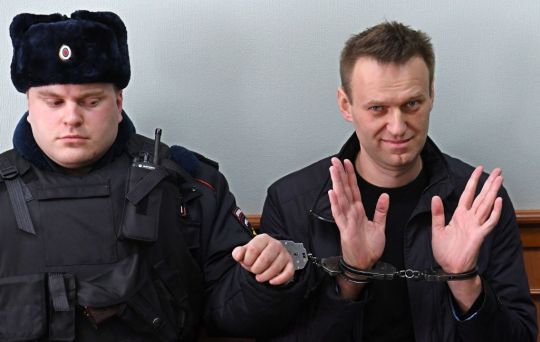
Kremlin critic Alexei Navalny, who died last week in prison, gestures during an appeal hearing at a court in Moscow on March 30, 2017.
Alexei Navalny Taught Russia’s Opposition How to Mobilize 02.20.2024
BYILYA BUDRAITSKIS
Alexei Navalny’s movement attempted a kind of mass mobilization rare among earlier liberal dissidents. He resisted the effort to stifle Russian society — an act of defiance for which he was killed.
"On Friday — unless it had already happened the day before — dissident politician Alexei Navalny was killed in a jail for high-risk prisoners in Russia’s far north. The true causes of his death continue to be hidden, and it is not even known where his body is, though his parents and wife are unsuccessfully trying to get it back from authorities. Navalny may have died from a blow, from poison, or from the systematic torture to which he was subjected throughout three years in prison. We haven’t been told.
Many, including myself, still find it difficult to come to terms with the thought of Navalny’s death. Yet it must be admitted that this has been the expected outcome since he returned to Russia in January 2021."
"Understanding this genesis of Putinism, inextricably linked with the criminal history of the redistribution of former Soviet property, is, as Navalny noted, “the most important issue of political strategy for all supporters of democratic development of the country.”
"And now, after the murder of Navalny, and faced with the rise of authoritarian forms of capitalism around the world, we must remember that without basic freedom of speech and assembly, the Left and the oppressed have very little chance of winning anything."
READ MORE https://jacobin.com/2024/02/alexey-navalny-death-putin-opposition-repression
“Alexei Navalny Taught Russia’s Opposition How to Mobilize”: Historian on Putin’s “Dictatorship”
Mar 04, 2024
"So, I think that the situation is very clear: If Ukraine will be not supported from the West, Russia will continue its offensive and realize its final goal: the elimination of Ukraine as a state."
LISTEN READ MORE Transcript https://www.democracynow.org/2024/3/4/ilya_budraitskis_navalny_russia_putin_ukraine
‘This is B.S.’: Maddow shreds ‘cravenness’ of Supreme Court delaying Trump trial
0 notes
Photo
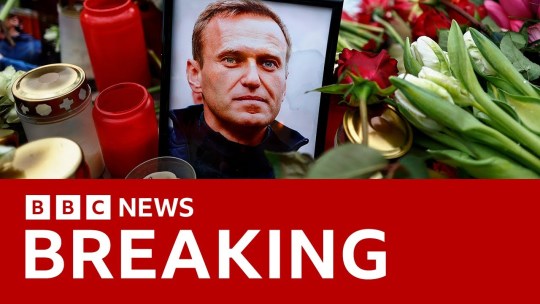
Alexei Navalny: Body of Russian opposition leader returned to mother | BBC News
0 notes
Text
Russian opposition leader Alexei Navalny’s body returned to his mother, spokesperson says
0 notes
Text
Aleksei Navalny’s Body Was Returned to His Mother, Allies Say
The Russian authorities have transferred the body, ending a grim battle for custody of his remains. source https://www.nytimes.com/2024/02/24/world/europe/aleksei-navalny-body-returned.html
View On WordPress
0 notes
Text
Alexey Navalny’s death
The fight for answers
More than three days after Alexey Navalny’s death, the Russian authorities have yet to hand his body over to his relatives or disclose an official cause of death. Below is a timeline of the main developments in his family’s fight to recover Navalny’s body and determine the truth about what happened to him.
Friday: Almost immediately after Russia’s Federal Penitentiary Service announces Alexey Navalny’s death, Russian propaganda network RT claims that Navalny died of a “detached blood clot.” However, a doctor who advised Navalny’s associates tells Meduza that this is an “unlikely” cause of death and would be impossible to confirm without an independent autopsy.
Saturday: An employee of the prison where Alexey Navalny died says his body has been sent to a morgue in the nearby town of Salekhard. When Navalny’s mother and lawyer travel to the Salekhard morgue, however, they find it is closed. When the lawyer calls the phone number on the door, he’s told that the body isn’t there. Another one of Navalny’s lawyers is told by an official from the local branch of the Russian Investigative Committee that the cause of Navalny’s death has “not been determined” and that his body will not be given to his family until the investigation is complete.
Meanwhile, a source tells Novaya Gazeta Europe that Alexey Navalny’s body has been in the Salekhard morgue since Friday evening but that no autopsy has been performed yet. A city paramedic tells the publication that Navalny’s body has bruises consistent with a seizure or outside restraint during convulsions and with CPR.
In the evening, human rights activists at the OVD-Info project call on Russians to contact the Federal Investigative Committee and demand that the authorities hand over Alexey Navalny’s body to his relatives.
Sunday: Journalists from Mediazona share traffic cam footage from Friday night that shows a convoy of official vehicles traveling towards Salekhard from a town near the prison where Navalny died.
By the early afternoon, more than 12,000 people have sent appeals to Russia’s Investigative Committee demanding that Alexey Navalny’s body be released.
Monday: In the morning, Alexey Navalny’s mother and his lawyers are turned away from the morgue in Salekhard. One of the lawyers is “literally pushed out,” Navalny’s press secretary Kira Yarmysh reports.
Later in the day, Putin spokesman Dmitry Peskov tells journalist that the issue of returning Navalny’s body is not being handled by the Kremlin because it’s “not a function of the presidential administration.”
In the evening, Kira Yarmysh says that according to the Russian Investigative Committee, Navalny’s body has been sent for a “chemical examination” that will take 14 days.
By Monday night, more than 65,000 people have contacted the Investigative Committee to demand Navalny’s body be given to his family.
4 notes
·
View notes
Text
0 notes
Text
navalny, the bickering goes...
https://abcnews.go.com/International/wireStory/return-navalnys-body-family-famous-russians-urge-authorities-107476181
View On WordPress
0 notes
